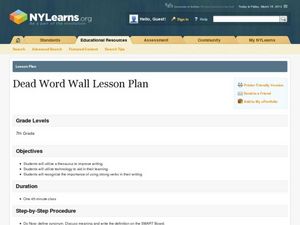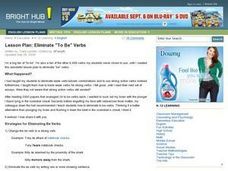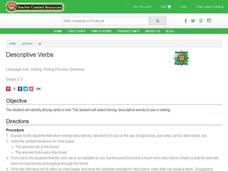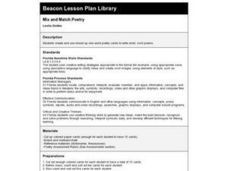Curated OER
Grammar Worksheets: Using Strong Verbs
Strengthen your pupils' writing with this worksheet, which provides a reference guide to using strong verbs instead of forms of is and have. Learners then rewrite twelve sentences to make them stronger. This is a great activity to work...
Virginia Department of Education
Developing an essay: Using specific nouns, strong verbs, and vivid adjectives
Feeling bored and unimpressed with word choice in your class? If so, consider this activity, which focuses on using specific and precise language. Pupils use highlighters, brainstorm independently and in small groups, and create a poster...
EngageNY
Writing the Children’s Book: Day One
With a brief mini-lesson plan, scholars learn about using strong verbs, sensory details, and precise descriptions. Next, pupils continue working on their children's book storyboards before choosing their strongest pages for peer...
Curated OER
Conventions: Strong Verbs
Fifth graders practice using strong verbs. In this conventions lesson plan, 5th graders brainstorm words to complete sentences and list lively and exciting verbs. Students act out meanings of certain words. Students come up with new ways...
Curated OER
Homophones and Vivid Verbs
Learners define and practice using synonyms, antonyms, homonyms, and homophones in complete sentences, paragraphs and essays. They include "vivid verbs" in their writing with the aid of a dictionary or thesaurus.
Curated OER
Vivid Verbs in Writing
Eighth graders explore how to incorporate vivid verbs in their writing. They review action verbs in sentences and view a Power Point presentation discussing possible verbs and their meanings. They view a website and retell a Greek myth...
Curated OER
Dead Word Wall Lesson
Help your writers eliminate "dead words" (words that are overused) from their writing. This lesson includes a SMART board presentation that will guide them through identifying, eliminating, and substituting "dead words" from sample...
Curated OER
Writing a Comparison/Contrast Paragraph: Using Vivid Verbs
In this vivid verbs learning exercise, students complete three activities that help them use strong, vivid verbs in the comparison and contrast writing.
Poetry4kids
Personification Poetry Lesson Plan
Scholars take part in two exercises to boost their knowledge of personification. After reading a detailed description and excerpts from famous poems, writers list action verbs and objects then combine words to create a humorous...
Curated OER
Eliminate "To Be" Verbs
Students remove to beverbs from their writing. In this verb usage lesson, students write strategies from eliminating to be verbs, then locate the verbs in their writing and eliminate as many as possible.
Curated OER
Descriptive Verbs
Students read a piece of literature and locate the descriptive verbs in the piece. For this descriptive verbs lesson, students understand the value of using descriptive verbs. Students rewrite a story they've written with more...
Curated OER
Said Is Dead
Students revise writing to improve organization and word choice. They check for logic, order of ideas and precision of vocabulary. Students list different verbs for the word "said." They write dialogue in which the speakers tell a story...
Curated OER
Rhythm, Verse and Rhyme: COMPOSING A LIST POEM
Students are provided an opportunity for self-expression. They collaborate with a partner and compose a list poem. Students practice reading and writing skills. They explore lists and catalogues--both elements of poetry and practical...
Curated OER
How Do Adjectives Improve Writing?
Using adjectives to create vivid descriptions is the focus of exercises in this resource. A cloze reading activity asks class members to add missing adjectives to passages from Mark Teague's The Lost and Found. They then read...
Curated OER
Mix and Match Poetry
Third graders compare boring and vivid words: adjectives, adverbs, and verbs. They list them and come up with 10 vivid words on cards. They shuffle all the cards and use 10 to write "vivid" poetry.
Curated OER
Collocations-Verbs
In this adverb worksheet, students select the best adverb from the list to complete each of eleven sentences. Each sentence is missing one word.
Curated OER
Stylistic Aspects of Composition
Students explore verbs. They list and demonstrate verbs. Students discuss words that connote different meanings. They write paragraphs based on their word selection. Students share their paragraphs with the class.
Curated OER
The Pearl: Found Poem
It's hard to beat the beauty of John Steinbeck's prose, so borrow a little of it to form your own found poetry. After kids finish Chapter One of The Pearl, they select the most evocative and vivid words to create found poems.
Curated OER
Vivid Adjectives
Students review adjectives and play a game where students compete to see who can write the most adjectives for a given noun. They write a story about one topic and try to use a variety of adjectives in sequence tto describe a noun.
Curated OER
Borrowing Narrative Skills from Mr. Fletcher: Using a "Prompts in Reverse" Technique to Inspire Your Writers
Help your class find their writing voices with this lesson plan which uses the work of Ralph Fletcher to guide a "Prompt in Reverse" activity. Using the chapter "First Pen" from Fletcher's Marshfield Dreams, learners decipher what they...
Curated OER
Nonfiction Genre Mini-Unit: Persuasive Writing
Should primary graders have their own computers? Should animals be kept in captivity? Young writers learn how to develop and support a claim in this short unit on persuasive writing.
Curated OER
Mouthwatering Adjectives!
Third graders write descriptions of food items in order to create a restaurant menu. They use adjectives to describe mouth-watering and vivid food and compare it to a boring adjective-lacking menu. They design and share their menus with...
Curated OER
Whose Voice Do I Hear?
Fifth graders examine the power of voice in writing by completing a story using words following a particular voice. They take simple nursery rhymes, then attempt to put their own voice to a revised version. An interesting activity on...
Curated OER
No Title
Fourth graders, after brainstorming a list of things good friends do for each other, apply prereading strategies to the book, "Be A Friend to Trees," and create similes and metaphors utilizing content ideas. They also sketch an...

























